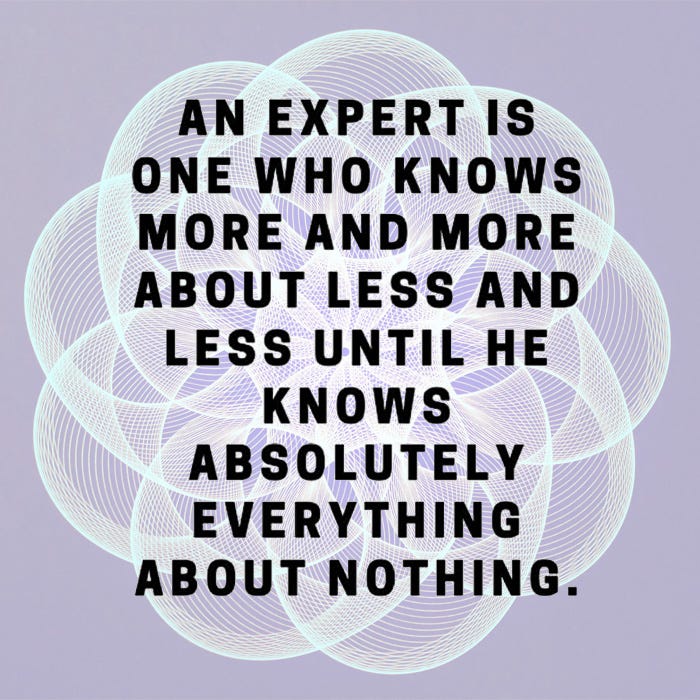Tutor: More and More About Less and Less
Have you ever wondered whether knowledge is a trap?
Obviously, ignorance isn’t really bliss, especially for those adjacent to the ignorant. That said, an excess of knowledge can prove dangerous when we assume specific mastery grants general mastery.
Do you know what I mean by this? Miyamoto Musashi, the samurai from whom I draw immense inspiration, adopted the idea that excelling in one area could easily unlock excellence in a host of unrelated fields. I love his quote, “From one thing, know ten thousand things,” but, some days, that sentiment rings hollow.
In reality, despite what billionaires and Hall of Fame athletes hear from their lickspittles, knowing a lot about one topic definitely doesn’t make you an expert in all others. Your new filing technique may be unstoppable (remember those days?), but your technique as an entrepreneur, singer, or friend might still need a bit of work.
Nicholas Murray Butler, a former President of Columbia University, is credited with clarifying a sentiment that existed before his time: “An expert is one who knows more and more about less and less until he knows absolutely everything about nothing.” Butler must have been thinking about some faculty members, because academics seem particularly susceptible to this fallacy of pervasive mastery. When I listen to some of my obviously intelligent and knowledgeable colleagues, I have to wonder why they seem so ignorant on a fundamental level:
Those who feel authorized to lecture peers–often erroneously–on basic matters
Those who assert as fact woefully outdated information
Those who make extreme claims without a shred of supporting evidence
Those who insist that searchable information be spoon-fed to them
Those who argue to score pedantic points rather than engage in mutual conversation
Those who prefer facts and see no harm in bruising feelings
As tutors, we make knowledge our stock and trade. Our students expect us to possess fathoms of insight and experience to help lead them from the shallows. But your success as a tutor depends on much more than just domain mastery. Balance out your studies with a broad diet of arts, humanities, sciences, and world history. Study people as assiduously as you do textbooks and webpages. Most of all, ignore that voice that whispers about how your remarkable math/grammar/sales skills provide unlimited license to opine on matters you haven’t studied!
And, lest you think I’m suggesting that expertise is the only trap to fear, consider this classic counterpoint as equally valid: “A generalist knows less and less about more and more until he or she knows nothing about everything.”
Find that fine line. Revel narrowly in your expertise as you seek to expand it broadly. Listen way more than you speak. Learn more and more about more and more, and you’ll never go wrong.
Tips, Tools, And Thoughts
How Universal Design for Learning helps students merge onto the 'learning expressway'
What is UDL and does it offer anything to tutors?
Differential Effects of Interruptions and Distractions on Working Memory Processes in an ERP Study
I think this study shows that distractions and interruptions are not as disruptive as we think?
Student Use Cases for AI
Since we know students will likely use AI for learning, let’s consider best practices.
People Who Avoid These 3 Common Words Have Very High Emotional Intelligence
Start your sessions with the right question.
The Era of Traffic Is Officially Over
If major news sites are seeing major declines in social media traffic, where does that leave small businesses?





